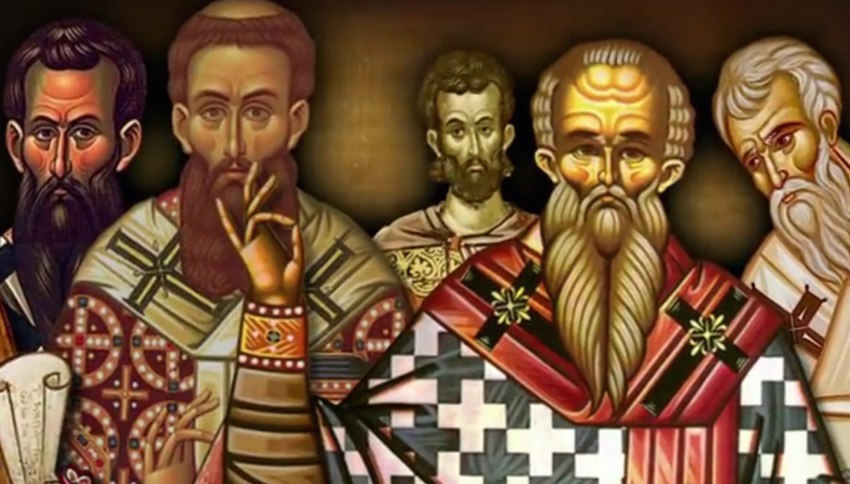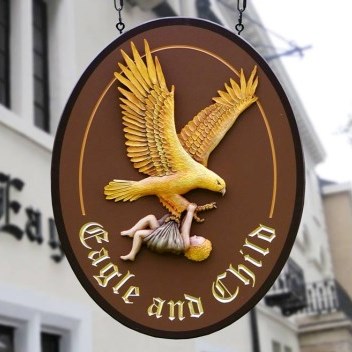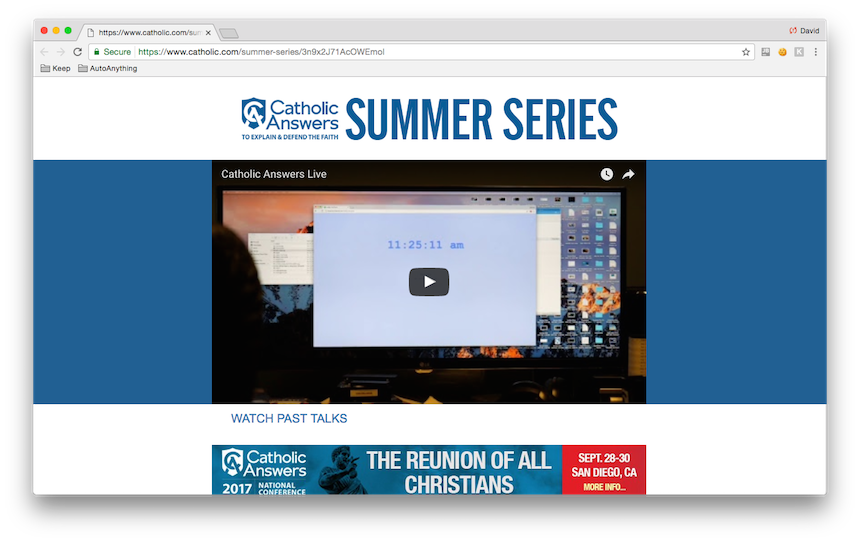Restless Heart: 11 – “The Early Church Fathers”


In this week’s episode, we return to the Early Church and discuss the successors to the Apostles, known as the Early Church Fathers. Somehow Nessa manages to talk about relationships… :-/
Please subscribe to this podcast using iTunes and Google Play and if you have any feedback or would like to pose a question for an upcoming episode, you can send us a message from the website or tweet us at @davidandnessa.
Episode 11: The Early Church Fathers (Download)
Audio Player
— Show Notes —
* I spent last weekend at the Catholic Man Show Campout. This was a camping weekend for the supporters of The Catholic Man Show podcast. We stayed at Clear Creak Abbey near Tulsa in Oklahoma.
* The Early Church Fathers are the successors to the Apostles.
* We previously discussed St. Justin Martyr, an Early Church Father, in Episode #1 of this podcast when we looked at worship in the Early Church.
* I mentioned my article I’ve written called “Before 300” where I outline 21 documented beliefs of Christians prior to the rise of the Emperor Constantine:
Part #1: The Church
1. The Church is Catholic
2. The Church has a three-fold structure of leadership
3. There is unity through episcopal authority and schism is evil
4. Sacred Tradition is authoritative
5. Worship is liturgical
6. There is Apostolic Succession
7. Peter has Primacy
Part #2: Salvation & Sacraments
1. The Eucharist is a Sacrifice
2. Jesus is truly present in the Eucharist
3. The Eucharist is taken to the sick
4. Infants are to be baptized
5. Baptism actually washes away sin
6. Priests forgive sins
7. Works are involved in salvation
Part #3: The Saints and Our Lady
1. Prayers are said for the dead
2. There is purgation after death
3. Relics are venerated and Saints are celebrated
4. Mary is the New Eve
5. Mary was a perpetual virgin
6. Mary is the Mother of God
7. Prayers are made and songs are sung to Mary
* While there is a definitive list of Doctors of the Church, there isn’t really a definitive list of Early Church Fathers. However, they have traditionally been recognized by four marks:
1. Antiquity
Did this person live sometime between the time of Christ and the end of the 8th Century? This span of time is called the “Patristic Era” (“Patristic” simply means relating to the Early Church Fathers).
2. Sanctity
Did this person live a life of outstanding holiness? Is this person a canonized Saint?
3. Orthodoxy
Did this person hold heretical views? Tertullian and Origen are two early Christians who are typically disqualified here due to some of their erroneous beliefs. We therefore instead give them the title of “Early Ecclesiastical Writers”.
4. Church Recognition and Approval
Has the Church and Christians throughout history generally referred to this person as a Father of the Church?
* There were about one hundred Early Church Fathers.
* The Early Church Fathers of the 1st and 2nd Centuries are usually called the “Apostolic Fathers” since they were born during the era of the Apostles.
* We then briefly spoke about three Apostolic Fathers:
1. St. Clement of Rome
* A successor to St. Peter as Bishop of Rome
* He wrote a letter to the Church at Corinth (AD ~96) in response to the ejection of their clergy
* In the letter he gives many Old Testament examples of those who flaunted God-given authority and who suffered the consequences
* In a particularly beautiful passage reminiscent of 1 Corinthians 13, Clement exhorts the Corinthians to love. I had a small rant about 1 Corinthians 13, pointing out that Paul is speaking of “agape” love rather than “eros” love.
2. St. Ignatius of Antioch
* A successor to St. Peter as Bishop of Antioch
* Taken to Rome in chains (AD ~107) to be thrown to wild animals
* Wrote seven letters, one to St. Polycarp (see below), several to nearby Churches and one to the Church in Rome
* In his letter to the Roman Church he begs them to not interfere with his coming martyrdom: “I beseech of you not to show an unseasonable goodwill towards me. Suffer me to become food for the wild beasts, through whose instrumentality it will be granted me to attain to God. I am the wheat of God, and am ground by the teeth of the wild beasts, that I may be found the pure bread of God”
3. St. Polycarp of Smyrna
* Bishop of Smyrna
* We have a letter he wrote to the Philippians, as well as an account of his martyrdom.
* In the account of his martyrdom, the Governor tells Polycarp to say “Caesar is Lord”, but Polycarp knew that “Christ/Jesus is Lord”. He was told to “revile Christ”, but he responded: “Eighty-six years have I served Him, and He never did me any wrong: how then dare I blaspheme my King and my Saviour?”
* Prior to being burned alive, Polycarp gives a prayer which sounds an awful lot like a Eucharistic Prayer.
* As he was burned, people reported the smell of baking bread.
* Some Jews claimed that the Christians might start worshipping Polycarp after his death. The author of the Martyrdom account says the following: “They did not realize that we could never abandon Christ, He who suffered for our salvation – the blameless one for sinners! – or worship any other. Him we worship as being the Son of God, the martyrs we love as being disciples and imitators of the Lord; and deservedly so, because of their unsurpassable devotion to their King and Teacher. May it be our good fortune, too, to be their companions and fellow disciples!”
* After his death, the Christians gathered Polycarp’s relics and and interred them in a fitting place: “There the Lord will permit us, as far as possible, to assemble in rapturous joy and celebrate his martyrdom – his birthday – both in order to commemorate the heroes that have gone before, and to train the heroes yet to come…”
* In last week’s episode, we spoke about another Early Church Father, St. Basil of Caesarea.
* If you would like to learn more about the Early Church Fathers, I have put together a blog point full of free resources. My favourite book on the subject is “When the Church was Young” by Dr. Marcellino D’Ambrosio.
* If you would like to read what the different Fathers wrote about the Sunday Gospel, you can look it up using the Catena Aurea (“Golden Chain”), a collection of patristic commentary which was assembled by St. Thomas Aquinas. You can also get it on your mobile!
* Towards the end of the show, I read some extended quotations from Tertullian and St. John Chrysostom on the subject of love and romance.
* Blessed John Henry Newman (1801 – 1890), an Anglican convert to Catholicism, said that “To go deep into history is to cease to be Protestant”
* Don’t just read the Fathers for apologetics, read them so as to discover examples to follow.
* Happy Halloween!

 Today I’m very pleased to announce the launch of my latest podcast, “The Eagle and Child”.
Today I’m very pleased to announce the launch of my latest podcast, “The Eagle and Child”.



 Today I wanted to talk about an apologetic strategy I use a lot: asking questions. You see, regardless of the topic, be it abortion, Christianity or Catholicism, there is always the temptation to spend most of your time telling someone what they should believe. People are rarely very receptive to being told. When I’m in that mode, it becomes very easy for me to become pompous and prideful. Questions help prevent this.
Today I wanted to talk about an apologetic strategy I use a lot: asking questions. You see, regardless of the topic, be it abortion, Christianity or Catholicism, there is always the temptation to spend most of your time telling someone what they should believe. People are rarely very receptive to being told. When I’m in that mode, it becomes very easy for me to become pompous and prideful. Questions help prevent this. A couple of months ago a reader mentioned David Bentley Hart, an Eastern Orthodox Christian philosopher. I’ve been listening to his lectures online and been quite enjoying them:
A couple of months ago a reader mentioned David Bentley Hart, an Eastern Orthodox Christian philosopher. I’ve been listening to his lectures online and been quite enjoying them: